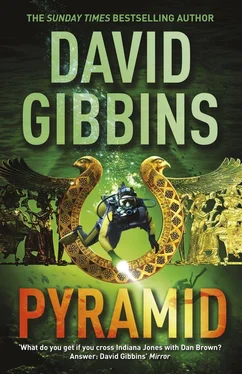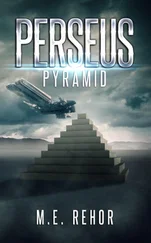I have imagined Akhenaten foreseeing this outcome, and engineering the escape of the Israelites to a place where their religion might flourish. He did so by finding a haven for them in the city of Jerusalem, a place whose allegiance to Akhenaten is revealed in the clay tablet archive from Amarna, as well as by bringing about the destruction of his own chariot army in the pursuit of the Israelites. This is the basis for the famous accounts in the Book of Exodus and the Qur’ān quoted at the beginning of this novel as well as for the fictional Red Sea discovery made by Jack and Costas in the Prologue.
* * *
In Fustat, the Old City of Cairo, blocks of masonry thought to have come from Akhenaten’s temple at nearby Heliopolis have been found reused in the medieval walls. This is the basis for the fictional discovery in this novel of a block beside the Ben Ezra synagogue containing a hieroglyphic cartouche of the pharaoh. If you visit the synagogue today, you may be told that the infant Moses was found in the reeds of a tributary of the Nile that ran up behind the precinct, a fascinating foundation myth by a people who had been forced out of Jerusalem by the Babylonians and the Romans and had returned to Egypt with their religion now strong enough to survive persecution and the vicissitudes of history.
For me one of the most powerful images of the demands of scholarship is a famous photo taken in 1912 of the Cambridge academic Solomon Schechter surrounded by boxes and table loads of fragments from the Cairo Geniza shortly after the collection had been removed from the Ben Ezra synagogue to Cambridge University Library. The image of a man bowed down before a project that he knew would occupy far more than his lifetime has added poignancy because the dust he inhaled when he first sorted through the scraps in the synagogue severely damaged his health and probably shortened his life. The story of the recovery and study of the Geniza documents is one of the greatest in the history of scholarship, and its discovery should rank alongside that of Tutankhamun’s tomb in the annals of Egyptian research.
In a fictional addition to the hundreds of thousands of fragments recovered when the Geniza was cleared out in the late nineteenth century, I have imagined a new exploration of the empty chamber revealing a hole in the wall with a few additional fragments overlooked in the clearance and restorations of the synagogue. The scrap with superimposed texts found by Jack and Maria closely mirrors actual palimpsests from the collection in which an earlier text on vellum has been scraped away to allow the sheet to be reused, but where the original text is still visible beneath. Some of the oldest of these texts have been fragments of Ben Sira (Ecclesiaticus) , the Book of Wisdom thought to have been first written down by Ben Sira in the third century BC. The overlying text, a fictional letter from the prolific Spanish poet Yehuda Halevi, draws inspiration from other texts in the archive related to Halevi, one of the most appealing of the individuals of the early medieval period who come alive again through the archive. The letter contains phrases from a number of actual letters and poems by him, examples of which can be seen on the Cambridge University Schechter-Taylor Project website and the many other websites from researchers around the world who continue to work on the Cairo Geniza.
* * *
In 1196, Malek Abd al-Aziz Othman ben Yusuf, son of the caliph Saladin, spent eight months removing stones from the north face of the Pyramid of Menkaure, causing a degree of damage not to be visited on the pyramid again until Colonel Vyse used explosives to blast his way into the burial chamber in the 1830s. For Malek the pyramid would have been a quarry for building stone, the cause of damage to many of the pyramids at this period, though some extremists in recent years have imagined a religious motivation and have threatened to complete what they regard as unfinished business, on much the same grounds that led to the destruction of the Bamiyan Buddhas in Afghanistan in 2001.
Another caliph who figures in this novel is the erratic Al-Hakim bi-Amr Allah (996 to 1021), founder of a public library in Cairo and patron of the sciences. He was also a persecutor of Jews and Christians — he ordered the destruction of the Holy Sepulchre in Jerusalem as well as the Ben Ezra synagogue — and his strange nocturnal behavior and disappearance in the desert added further to his mystique. Whether or not he was seeking some kind of spiritual redemption or simply relished the solitude is unclear; all that is known with reasonable certainty is that he took to wandering alone in the desert south of Cairo at night, and after his disappearance all that was found was his hobbled donkey and bloodstained clothes.
I have imagined that the place he discovered was the same one entered from the Nile by my fictional Corporal Jones, who also appears in my novels Pharaoh and The Tiger Warrior . Of the two men I have imagined accompanying Jones on that night in 1892, the French diver is fictional, though his gear is based closely on the compressed-air cylinder and reduction valve that had been developed recently by the Frenchmen Rouquayrol and Denayrouze. It is fascinating to think of the military and civil impact had a fully functional demand valve indeed been developed in secret by this date, as in my story, and not lost beneath the Nile. The second character, Charles Chaillé-Long, is historical, and one of the more colorful of the adventurers to make their way to Egypt at this period. An American of Huguenot French ancestry — hence his surname — he had fought in the U.S. Civil War, served under Gordon in Sudan, explored Lake Victoria, and worked as an international lawyer based in Alexandria, and later made a name for himself in America with his sometimes embellished tales of his adventures in deepest Africa. Chaillé-Long was one of some sixty veterans of the U.S. Civil War from both sides to accept commissions in the Khedive’s army in Egypt, a little-known but fascinating episode that — though unofficial — marks the first major involvement of Americans in the affairs of the Middle East. They were in the employ of an Islamic regime but one that was ultimately to be reined up against the growing movement of the Mahdi in Sudan.
Fustat and the Ben Ezra synagogue would have been intimately familiar to another historical character of this period, Howard Carter, the future excavator of Tutankhamun’s tomb, when he first arrived in Egypt as an impressionable teenager in 1891. Before being whisked off to work as a draftsman on the excavation of Akhenaten’s capital at Amarna, he would have learned much about the characters and byways of Old Cairo, knowledge that would have stood him in good stead after he resigned from the Antiquities Service in 1905 and became an antiquities dealer. The diary entry from him in this novel is fictional, though it reflects a constant curiosity and quest for new finds that ultimately were to lead him back to the Valley of the Kings and fame. During his years in Cairo after his resignation, he would undoubtedly have come across men like the fictional Corporal Jones, former British soldiers who had stayed to try their hand in Egypt but had fallen on hard times, some of them Sudan war veterans disturbed by their experiences and with tall stories to tell of tombs and mummies that might nevertheless just contain a kernel of truth.
* * *
The tomb of the chariot general in the mummy necropolis in the Faiyum is fictional, though the necropolis itself is based on reality. The region has produced tombs of officials of New Kingdom date; it features as well in my novel Atlantis , where a crucial papyrus is discovered as a mummy wrapping. Despite many claims and several hoaxes, archaeological evidence for the destruction of the chariot army described in the Book of Exodus and the Qur’ān has never conclusively been identified. What is well substantiated, though, is the evidence for Minoan influence on New Kingdom Egypt, in particular Queen Ahhotep’s epithet “Mistress of the Shores of Hau-nebut,” found on a stele set up by her husband Ahmose at Ipetsut in the Temple of Amun, and evidence for Minoan connections in her grave goods. If “Hau-nebut” does indeed refer to Crete, and if she was therefore Minoan, it is fascinating to imagine her bloodline influencing the character of the pharaohs in subsequent dynasties. Whether this lay behind Akhenaten’s tastes or was simply his receptivity to external ideas, the wall paintings from his palace at Amarna are strikingly similar in naturalism and color to those seen in Minoan Crete.
Читать дальше












